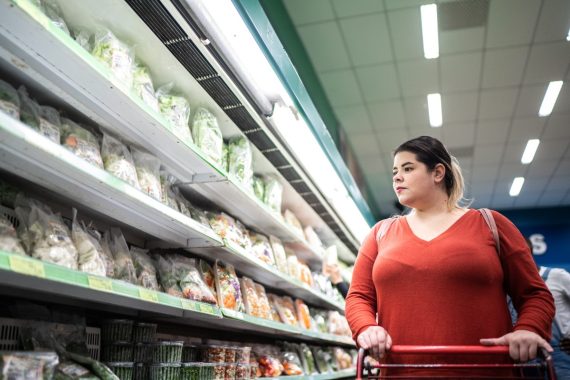Tough measures are needed to fix the UK’s ‘broken food system’ and tackle the obesity crisis, a House of Lords committee has warned.
A ten-month inquiry found an ‘utter failure’ of successive governments to tackle the obesity crisis and recommended stringent measures including taxes on junk food and a total ban on advertising of unhealthy food by 2029.
Too often ‘misguided’ fears over the ‘nanny state’ have prevented measures against the food industry being put in place, the Lords Food, Diet and Obesity committee found.
Obesity and diet-related disease are a public health emergency with England having one of the highest rates of obesity among high-income nations, it said.
The failure across all income groups to meet dietary requirements is not down to a ‘collective loss of willpower’ but a consequence of unhealthy, often highly processed foods that are widely accessible, heavily marketed and cheap, the committee concluded.
Two-thirds of adults are living with overweight or obesity, and 29% are living with obesity. More than 20% of children start primary school with overweight or obesity, rising to 36.6% by the time they leave.
‘The food industry must be held to account now for the rise in unhealthy diets and obesity,’ it said.
There is no ‘magic bullet’ and a comprehensive strategy is needed that:
- Ensures food businesses that fail to meet healthy sales targets are excluded from any discussions on the formation of policy on food, diet and obesity prevention.
- Bans the advertising of less healthy food across all media by the end of this Parliament, following the planned 9pm watershed and ban on paid-for online advertising in October 2025.
- Introduces a salt and sugar reformulation tax on building on the success of the levy on soft drinks. The Government should consider how to use the revenue to make healthier food cheaper.
- Gives the Food Standards Agency independent oversight of the food system.
- Includes the immediate development of an ambitious strategy for maternal and infant nutrition while driving up compliance with school food standards as well as allowing auto-enrolment for Healthy Start and free school meals.
The report also called for the Government to commission more research into the links between ultra-processed foods and adverse health outcomes and update dietary guidelines to reflect any new evidence that may emerge.
It acknowledged that demand for obesity drugs is putting immense pressure on the NHS and was not a sustainable solution.
Baroness Walmsley, chair of the Food, Diet and Obesity Committee, said: ‘Over the last 30 years successive governments have failed to reduce obesity rates, despite hundreds of policy initiatives.’
The failure is largely due to policies that focused on personal choice and responsibility, she said.
‘Both the Government and the food industry must take responsibility for what has gone wrong and take urgent steps to put it right.’
She added that after recent comments from the Prime Minister, Lord Darzi and the Secretary of State for Health, she hoped there was now ‘an appetite’ to shift towards prevention of ill health.
Dr Nerys Astbury, associate professor of diet and obesity in the Nuffield Department of Primary Health Care Sciences at the University of Oxford, said ‘immediate, specific, and measurable actions’ are needed to tackle this well-established public health emergency.
‘The report highlights that between 1992 and 2020, almost 700 policies were proposed by successive governments to tackle obesity in England.
‘Yet the prevalence of obesity continues to rise, as do the rates of many diseases associated with obesity including type 2 diabetes, cardiovascular disease, and certain obesity-related cancers.’
It will take time and political will to implement the recommendations, she added.
‘Some of these policies suggested may be unpopular, and there will likely be resistance to making some of these changes, particularly from the food industry who try to resist policies which could impact their profit margins.’















More half-baked ill informed meddlings from politicians.
Quite enough tax and regulation already thanks.
Of course, people bear no individual responsibility for their obesity, it’s all the food industry’s fault.
Compulsory BMI check for all members of the House of Lords, and no admission or expenses paid for any with a BMI over 30.
That will help.
Dave Haddock and Doctor Doom; have you studied public health, psychology, or any related fields? The only measures that really tacked smoking were very high taxes and obstructions to smoking eg bans in indoor spaces etc. Obesity is arguably a much greater threat to health than smoking ever was. And the super processed food is likely causing a lot more health issues beyond obesity due to all the additives and effect on gut biome. High taxes, advertising bans, all the same moves for tobacco will work for this shite they call food and that I would call industrial edibles. The fact that doctors are talking shite like you are makes me lose hope. I expect this from Wes Streeting. Not doctors. You did go to medical school? I remember my training on public health. Maybe your dietary additives are causing some cognitive decline. It is probably another thing these industrial edibles do
Yet another of the many harms of Lockdown; the self-appointed health Stasi have been emboldened in pursuing their crusade to impose their lifestyle ideology on everyone else. Self righteous and self unaware, with no regard or respect for others.
It will end badly.
Two fingers to the lot of you.
I’m off for a plate of pastries at Gail’s. Bye!